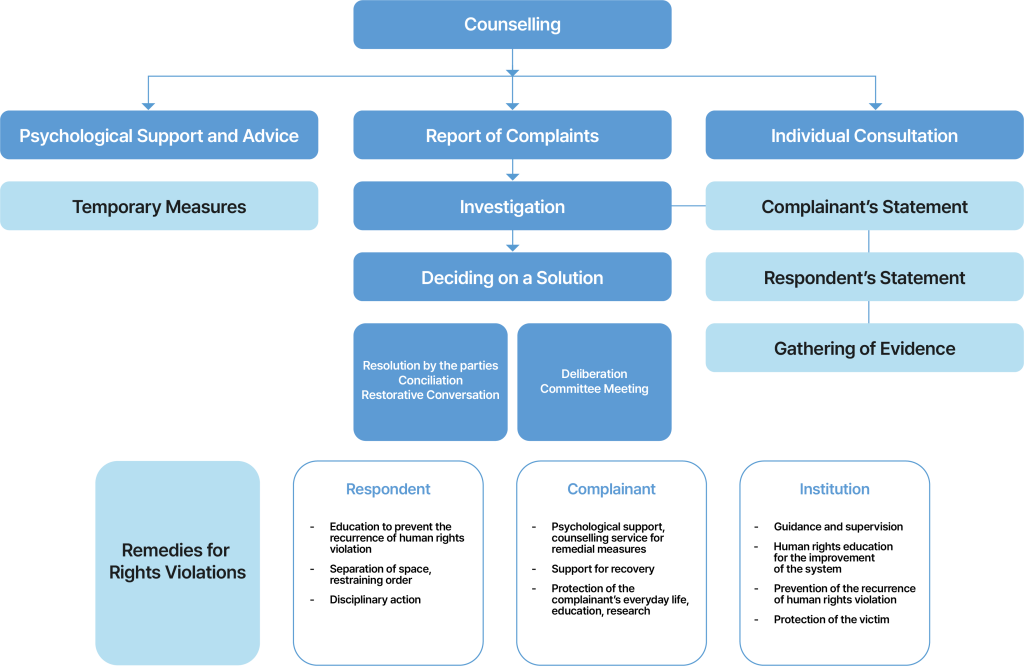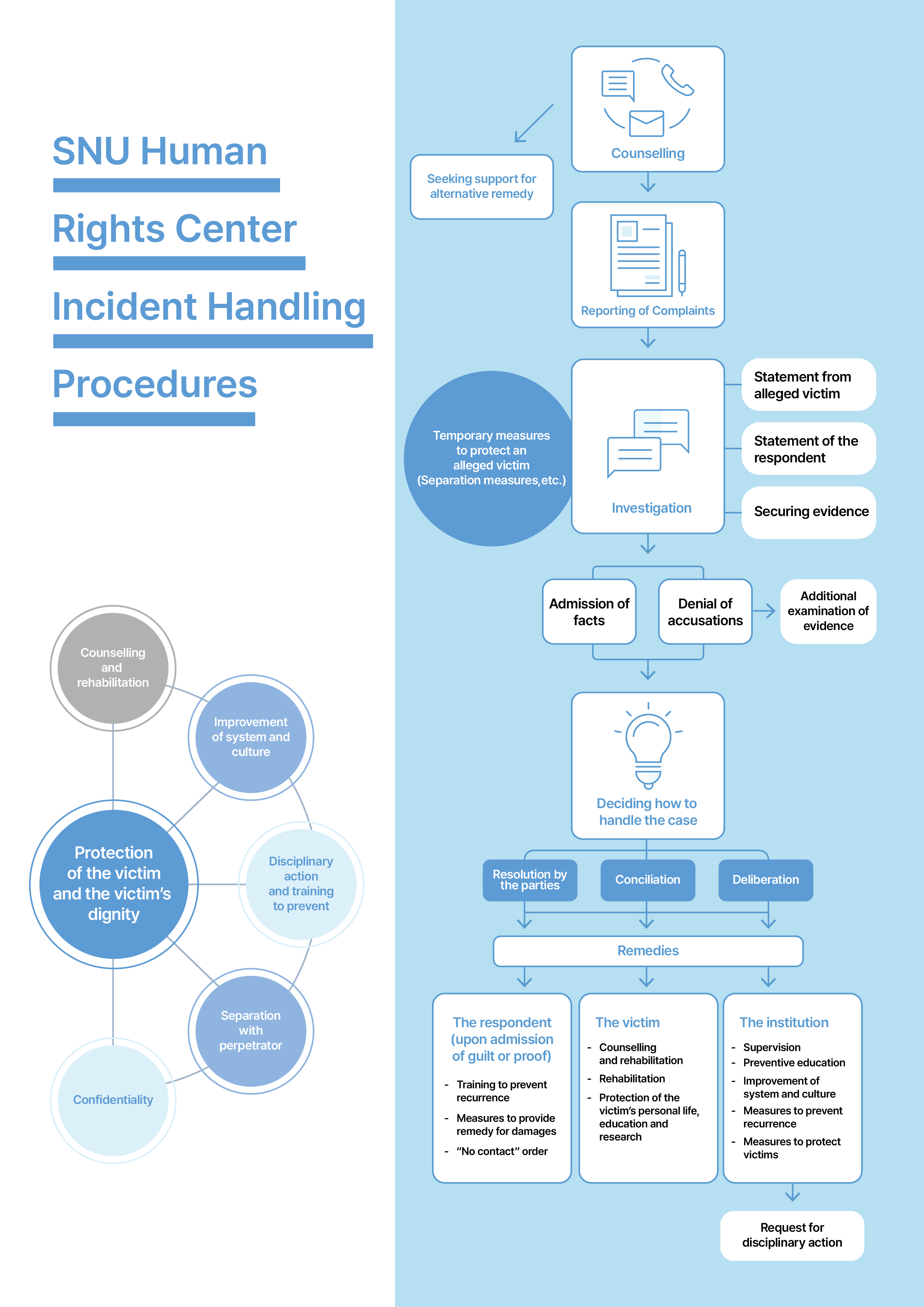Introduction to Counseling Service and Report Mechanism
All humans have equal dignity and the responsibility for mutual respect for the rights of other individuals.

Seeking Initial Advice
If you feel that you have experienced sexual harassment/violence, other human rights violations, you can seek advice and resources for resolving the issue from one of our advisors at the Center. You do not have to report a complaint at this stage. You can decide later whether to report a complaint or not after consulting with the advisor.
Further Counseling
You can get information about legal, psychological, and medical supports. You can also seek a resolution with the other party through conciliation or restorative conversation arranged by the Center. If you only need counseling service, we can provide you with the counseling service to help recovery as well as further information about external agencies for psychological support in case you need it.
Reporting an Incident
If you wish to resolve an incident of sexual violence or other human rights violations in accordance with the university regulations and procedures, you may request for an investigation by submitting an incident report to the Center. To report an incident, you should fill out the Incident Report Form and the Personal Statement Form and then submit them to the Center via email or in person.
Composition of the Deliberation Committee
When a report is filed to the Human Rights Center, a Deliberation committee is organized in order to deal with the problem in an impartial manner. The Deliberation Committee may have three to nine members including the committee’s chair. The Committee also includes lawyers as well as experts outside of the university. The Inquiry Committee investigates and deliberates on all the facts based on statements provided by the person who has filed the report, the respondent, and so on. The complainant can request follow up measures that are necessary for protection of their human rights during the resolution process. Furthermore, we try to ensure that no one is put at a disadvantage on the grounds that they reported a case, provided statements, became a witness, and/or submitted relevant materials to the Human Rights Center.
Conciliation | Restorative Conversation
The Human Rights Center may use its conciliation procedure and recommend an arbitration in order to resolve a conflict between concerned parties and to settle proper remedies.
Remedies based on the results of an investigation and deliberation
We take measures for remedy following the committee’s investigation and deliberation to seek a fair resolution of cases.
- Recommendation of Settlement: The Center Director can suggest necessary remedial measures to the parties involved and recommend a settlement between them.
- Recommendation for Remedial Actions: If the Deliberation Committee finds a human rights violation, the Director of the Center can recommend either the respondent or the head of the concerned department to take appropriate remedial actions or address the issues related to the policy or practice in question.
- Disciplinary Actions: If the Deliberation Committee finds a human rights violation, the Center Director can request the SNU President for disciplinary action.
Relevant Documents
Information on Case Investigation
- • Investigation Scope
The SNU Human Rights Center initiates investigations of human rights violations (including sexual harassment and sexual violence) involving employees or students of SNU, by its own authority, or when complaints are reported by victims or third parties, or when an SNU employee or student files a complaint. (Articles 3, 16 and 17 of SNU Human Rights Center Regulations) • Investigation Method
To conduct an investigation by its own authority or upon the receipt of a report, the entities and persons concerned (department, etc.) may be summoned, asked to listen to or submit statements, or asked to submit relevant materials, participate in an on-site investigation, or go through a fact inquiry. Any person requested to submit a statement shall do so within 14 days. (Article 23 of SNU Human Rights Center Regulations)
Case Handling Procedure, Etc

•Resolution by the parties: Hearing of party opinions → Drawing up of written pledge → Fulfillment of pledge
•Conciliation: Head of the counselling office’s or the conciliation Committee’s opinion and agreement of the parties → Recommendations → Implementation of recommendations
•Deliberation Committee: Attendance and testimonies by involved parties and persons concerned → Decision (violation: request for disciplinary action, training programs, measures to protect victim, recommendations for system improvement, etc.) → Notification of decision → Implementation of decision
Remedies
•Temporary Measures
Even before a decision is made to begin an investigation, if it is acknowledged that risk exists that the human rights violation will continue and the damage therefore expand, a party may request or the Center may decide by its own authority that the respondent or the head of the relevant department act to stop the alleged human rights violations immediately, that a “Separation measure” order be put in place between the respondent and the alleged victim, or that other measures to protect the alleged victim be implemented. (Article 20 of SNU Human Rights Center Regulations)
•Remedies, Recommendations for Correction/Improvement
If it is recognized that a violation of human rights has occurred, the respondent or the head of the relevant department may be recommended to take appropriate actions, such as correcting or improving the system, policies, or practices. (Article 33 of SNU Human Rights Center Regulations).
•Statement of Opinions
Even if the investigation does not show the case to constitute a human rights violation, if the investigation acknowledges reasonable grounds to believe that it may have, opinions may be expressed to the respondent or the head of the relevant department. (Article 33(2) of SNU Human Rights Center Regulations)
•Resolusion by the parties and conciliation
In the event where both parties discuss ways to recover damages, or where the Center is able to provide the parties with a plan for appropriate remedies and they have agreed thereto, the case may be resolved through arbitration and arbitration procedures. (Articles 30 and 31 of SNU Human Rights Center Regulations)
•Request for Disciplinary Action
A request for disciplinary action against a party may be submitted to the SNU President if disciplinary action is deemed appropriate, as prescribed by law and/or school regulations, if a party fails to comply with the measures taken to protect the victim, if a party retaliates or puts other parties related to the case at an unfair disadvantage, if a party reveals the identity of other parties, or if a party interferes with the Center’s investigation and remedies. (Article 34 of SNU Human Rights Center Regulations)
Party Rights and Obligations
•Right to Counsel and for that Counsel to Accompany Each Party
A party may be accompanied by his/her representative at investigation procedures, etc. with prior notice. (Article 24(2) of SNU Human Rights Center Regulations)
•Right to Remain Silent
Each party has the right to remain silent. (Article 24(1) of SNU Human Rights Center Regulations)
•Right to Attend Testimony
Both the alleged victim and the respondent have the right to attend the Deliberation Committee meeting and give their testimonies, for the alleged victim to have sufficient opportunity to speak about the facts of the report and for the respondent to defend him or herself.
•Right Not to be Disadvantaged
No one shall be intentionally disadvantaged, such as through a position transfer, disciplinary action, unfair treatment, or other disadvantages related to status or labor conditions, for having provided the Center with reports, statements, and testimonies, submitted documents, or responded to the Center in any other way. (Article 37 of SNU Human Rights Center Regulations)
•Protection of and Support for the victim
The victim may request necessary support from the Center Director to protect his/her human rights in the course of handling the case. The Center Director may provide psychological counseling, medical expenses, or any other matters required for the protection of the victim depending on the severity of the damage inflicted upon the victim and the necessity of protection and support. The Center Director may request cooperation from related departments on campus to provide housing, legal, economic, and medical support, and any other matters required for the protection of the victim.
(Article 35 of SNU Human Rights Center Regulations)
•Implementation of Remedy
A party that receives a recommendation shall follow it unless there is a valid reason not to do so, and shall promptly notify the Center of the result of its implementation. (Article 33 of SNU Human Rights Center Regulations)
•Confidentiality
Each party shall maintain confidentiality in respect to the details of the incident and the personal information of the parties or persons concerned (names, contact information, identity, affiliations, etc.). (Article 31 of SNU Human Rights Center Regulations)


